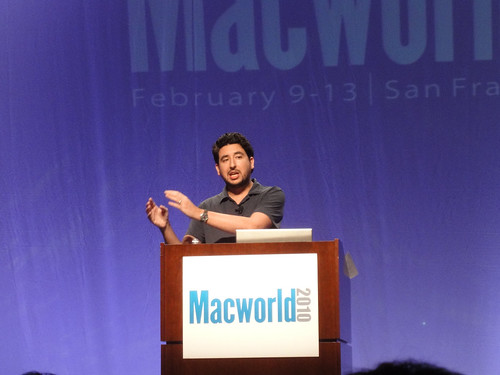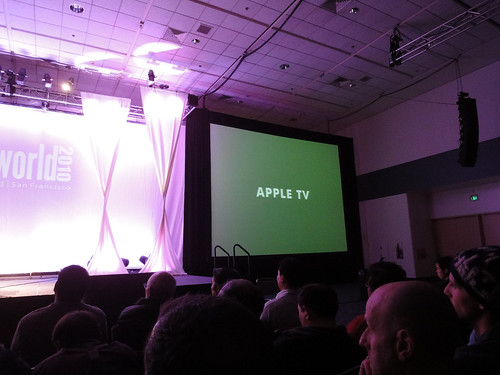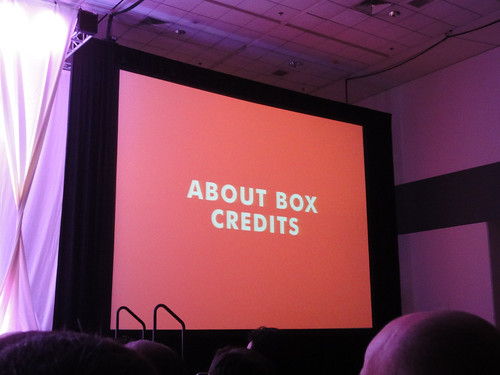I ducked out of work early today in order to catch John Gruber's talk at Macworld. His talk was pretty good — it was basically a new essay (like what would appear on Daring Fireball), but deliver spoken word, instead of through the web. What follows are the rough notes that I took.
Started Daring Fireball in 2002, been writing about Apple for 7 years. Picked a good time to start writing about Apple professionally, Apple has been on a good growth trend since then.
Most of what he's written about Apple has been positive, which makes sense, because they've been on a good run.
A certain type of person that when they do disagree with me, they bring out the "F-word".
"Fanboy".
That's the type of word you use to cut off reasoned debate. In general, try to let writing speak for itself. But sometimes he tries to respond, offers to make correction if they point out which specific part of article is wrong.
"If you love Apple so much, why don't you marry them?". There is such a thing in America as corporate personhood. for example, right to enter a legally binding contract. recently, supreme court issued a ruling that corporations also have the right to freedom of speech under 1st amendment. in protest, corporation in maryland declaring that they want to run for congress. A couple of years from now, i'll be able to be introduced as John Gruber, Mr. Apple Incorporated.
In no particular order, except for the first one.
Steve Jobs — forced out of Apple 25 years ago. For all the handwringing about what happens to Apple w/o steve jobs, think back to '85, he delivered a hit, and they fired him. He's the greatest product guy in history. He was blindsided. His error was in failing to realize that companies poorly structured and poorly run, tend to do the stupidest thing. In the aftermath of that, was he thought about how a large company should be structured. Jobs brought in Sculley because he bought into notion of product guys and business guys running the company.
What does he create? one product he designed himself, personally. Apple. Simplicity, clarity, direct in favor of abstract, describe Apple as a whole.
Paradox: he's irreplaceable, no doubt. But on the other hand, he will be gone some day. Comparison point: Walt Disney. Never satisfied with previous success, always onto the next thing. company struggled after Walt's death.
Pessimistic take - Apple is organized as company, around one guy. Remove keystone (Jobs), and the whole thing crumbles.
Optimistic take - maybe Apple is more like Pixar. Pixar is a system for enabling creative output, a culture.
AT&T — one of 70 carriers around the world that carry the iPhone. But important, because it is the only one in US. In places like SF, AT&T's service is not so good. Almost comical how bad AT&T's service is here in SF. Fundamental thing to understand about Apple is that they seek to control their fate. If you want it done right, you have to do it yourself. That's why they got into retail. iPad is going to ship with new CPU designed in house, A4.
One thing that's important to current business that they can't and don't control - the mobile carriers. Seeks to reinforce point of Apple trying to control all aspects of business. Same speculation with run-up to iPad, was run-up to the iPhone. Of course they're going to ditch AT&T, they have screwed up too many times. Of course they're going to stay with AT&T, because Apple has them by the balls. iPhone carries a lot of weight. AT&T is under pressure to keep iPhone.
How is Apple going to get out of this mess? Going to be patient for now, give AT&T more time to fix network. Apple's top executives infrequently speak, but when they do, you can take it at face value. As it stands now, AT&T's problems are draining Apple's brand equity.
Computers — next step from CLI was macintosh, GUIs. Far less cool than something like HAL, that you could talk to. today when people think of the computers, they think of "Minority Report". What did we really get? the iPad. That is what the future of computing looks like today, like what the Mac was in '84.
but now that it exists beside the iPad, we find if Apple can chew 2 pieces of gum at the same time. Apple has never had 2 computing platforms thrive at the same time. In 80's, the Apple 2 started dying as soon as the Mac came out. In the 90's, Apple introduced the Newton, which never took off. And at the same time, the Mac was at its lowest point ever. In the '00's, Apple grew iPod and Mac at same time, but they don't overlap. This is still reasonably true with Mac vs. iPhone, due to size of display.
App Store — 2 schools of criticism. 1st - Apple is headed in entirely wrong direction. meaning is that it all goes through Apple funnel. Nobody saying they should scrap app store, they should do with app store like it is on Android Marketplace. But there is a checkbox which allows apps from sources other than marketplace. Great argument, they are valid. Belief is that Apple won't do it.
2nd school - heading in a right direction, but they are a few degrees off course. Concern is that so much criticism is #1, and Apple is convinced, so they just ignore all criticism, which means they're ignore course correction criticism. Few degrees off course, but going fast, doesn't take long to get lost.
Updates take too long to get approved (bug fixes, etc). going back to days when software fixed on floppies and CD drives. Needed expensive QA process to make software bulletproof before shipping. Frustrating for developers and users.
Rejections should be for glaring and obvious things. Google voice, no way it should be rejected. Should be about quality control, not competition control. In long run, bad for Apple's business.
Good news, is that they're fixing this. Since Christmas, turnaround time for approvals have improved dramatically. App store puts Apple in uncharted territory. it's like the Mac, in that it has lots of developers. But on the other hand it's like consoles, in that all software is approved by platform vendor. Never been tightly controlled console system with 100k+ titles. If it proves to be unsustainable, what will Apple do?
Security — difference in semantics between security and safety. Real world analogy is quality of locks on doors of house. Safety is how likely to have a problem. Microsoft has put more advanced security measures into windows than what exists in Mac OS X, which is place than needs it. One thing Apple is doing wrong — their response to publicly disclosed vulnerabilities in OSS software in Mac OS X. Apple didn't patch SSL flaw for 75 days after OpenSSL had patched it. Not an isolated incident, Apple always last vendor to do fix. They don't see it as a problem. Apple should try to be first vendor. Apple is company with biggest target for flaws within open source projects. Microsoft uses all their own stuff, no OSS code.
Mobile Me — why does mobile me exist? 1 is for syncing. another side is webapps. what is the point of that? at mac, going to use mail / ical / etc. if not at mac, shouldn't use iphone? how many use idisk? how many happy? none. how many use Dropbox? Lots. Happy? Lots. How can a couple of guys at Dropbox kick the crap out of Apple and their iDisk team? Should Apple buy them? dunno. At the minimum, Dropbox has set a baseline.
Backups — core products use, as primary data store, local storage. Can sync to iTunes, and make backup of mobile devices, which is good, works well. awful lot of people out there who don't sync their iPhones. some people don't even know that they can do it. Google has other approach, where it syncs only to the cloud. completely self sufficient, even downloads OS updates OTA.
Time Capsule is sortof the right idea, once configured, backups just happen, has versioning, etc. but doesn't work for people who don't sync devices via USB. ultimately, long term, has to be in the cloud. puts Apple on poor footing against Google - primary datastore then is in Google-run datacenter, which probably is about a good a place for your data to be anywhere in the world. skeptical about Apple's ability to do cloud based backups, because they've never been successful here.
Apple TV — problem with Apple TV isn't hardware or software, because it's about one thing: watching hollywood TV and movies from the iTunes store. Bunch of problems with that - not enough content in iTunes store. A lot of what is there isn't priced right. Part of core product is out of Apple's control - run by movie studios and TV networks. All old-growth executives want to go back to way things were. No Tivo. Want music? Buy $18 cd. Not going to happen, not going to put digital genie back into bottle. When movie/TV execs look at music industry, instead of seeing that Apple saved music guys, movie guys say that Apple didn't get them back to where they were.
Is there a video store in the real world that doesn't have "True Lies"? can't rent on iTunes. New releases have 2 - 4 week wait to rent. Nothing Apple can do about it. For TV shows, whole model is broken. people don't want to pay per episode. 70 years of evidence is that people want free TV subsidized by advertising.
Best example of how screwed up TV guys are, is Hulu. Technically, it's great — good quality, performance, etc. guys who run it have crazy brick wall in head between TVs and computers. Hulu is for computers. Okay because you couldn't watch their shows on that device before. TV is just a display.
Contrast with Boxee — they're just agnostic, just getting video at your TV. Hulu guys freaked out when Boxee put Hulu on TV. Doesn't make any sense — it's all just 1's and 0's. Don't see how Apple can get from where they are, to where they need to be, when negotiating with people who are that stupid.
Arch Rivals — Microsoft in its heyday was relentless, and fearless, and had rivals everywhere. They even had OS competitors (cf. OS/2 from IBM). Last one they did it to was Netscape, and they got in trouble for that, because of how they did it. Since that time, the one and only new thing that they've done is Xbox. no coincidence that it has direct rivals in Sony and Nintendo. Rivals help you focus.
Who else is there? Google. they are crafty competitor. "don't be evil" really means "don't be Microsoft". culturally, they are opposite of Microsoft. Microsoft is full of middle managers. Google has almost no managers, all engineers. 70:1 engineers to managers. not that engineers are unaccountable, federated company, engineers have more flexibility.
One area of clear competition is mobile OSes — Google has two, Android and Chrome OS (no relation at code level). Apple has iPad competing against Chrome OS, and iPhone against Android. Apple's products are siblings.
Google doesn't care if Chrome OS and Android win, so long as winner uses lots of Google services. From Apple's point-of-view, if Google's OSes do well, it's bad for Apple, because they sell less iPhones and iPads.
One company is Palm — webOS is actually pretty good. Confusing why it's not a bigger hit, probably due to iPhone. They don't have Apple's muscle. It's good for us if Palm does well with webOS. has same sort of DNA as Apple, focus on user experience and simplicity. It's good for Apple as a company for palm to do well.
About Box Credits — all of Apple's apps have boring about box, for last 10 years. Used to be, about box was place were developers could get creative. Like book cover. In the old days, you could get a list of people who made the app. Policy to remove names was made by steve jobs when he came back, public reason to stop poaching of employees. Apple was struggling, maybe it was true. good recruiters in bay area don't need about box credits to know who's working at Apple.
Compare this to collaborative, creative endeavor - movie and TV shows. At end of show, roll credits. Unions have rules about the end-credits, getting out of hand, 9 min credits now at end of movie. Everyone who participates in creation, gets credit. This hasn't hurt Pixar in retaining talent.
Apple has made a point about the artistic talent that goes into their products, particularly on the software side. Artists should get to sign their work.



